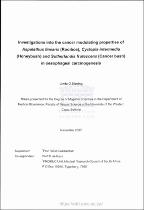lnvestigations into the cancer modulating properties of Aspalathus linearis (Rooibos), Cyclopia intermedia (Honeybush) and Sutherlandia frutescens (Cancer bush) in oesophagea! carci nogenesis
Abstract
This thesis contains scientific evidence on the anticancer properties of two unique South African herbal teas, rooibos and honeybush, and the herbal plant Sutherlandia frutescens (cancer bush) using an in vivo oesophageal cancer model in rats and a human cancer cell line in vitro. Green and black teas (Camellia srnensls), known to modulate oesophageal cancer in rats were included as references. The unfermented herbal teas reduced tumour multiplicity (number and size) by significantly (P<0.05) decreasing the total mean number and the mean sizes of papillomas. Green and black teas significantly (P<0.05) reduced the total mean number of papillomas, while the mean size was markedly reduced. The Sutherlandia frufescens infusion markedly reduced the total mean number and mean size of papillomas. Modulation of the growth kinetics of the early neoplastic oesophageal lesions by the teas, presumably the polyphenolic constituents, is likely to reduce their proliferative activity. A total polyphenol intake threshold of 7 mgi 100 g body weight is proposed for the herbal teas to effectively modulate oesophageal papilloma development in rats. Specific polyphenol subgroup ratios also appear to be important, as 'fermentation" chemically alters polyphenols and reduces the water soluble polyphenol content of rooibos and honeybush and therefore reduced their chemopreventive properties. The cytotoxicity and anti-proliferative properties of the different teas were also evaluated in a human oesophageal cancer cell line. Although the cytotoxicity could not be measured accurately when using the lactate dehydrogenase (LDH) release and tetrazolium bromide (MTT) colorimetric assays as a result of colour interference of the teas, satisfactory results were obtained when employing flow cytometry, CellTiter Gloo Luminescence and Brd incorporation cell proliferation assays. Plant matrix and media interactions effected by Sutherlandia frutescens also prevented the determination of cytotoxic parameters in the cancer cells. When utilising flow cytometry and cell viability assays, unfermented rooibos tea displayed properties comparable lo lhe Camellia smensls teas, while honeybush exhibited weaker effects. Unfermented rooibos, however, exhibited a more potent inhibitory effect on cell proliferation when compared to green and unfermented honeybush teas. lmpairment of the proliferative capacity of the papillomas and the human cancer cell line could be important in utilizing the herbal teas as chemopreventive agents against oesophageal cancer.

